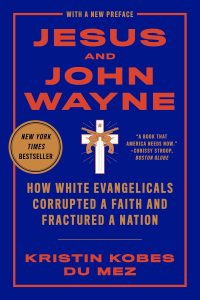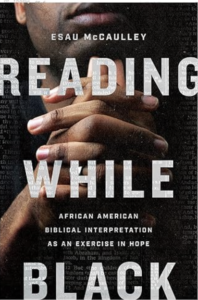 Summary: American Christianity has slowly adopted a Jesus that looks and acts a lot like John Wayne, and that has distorted Christianity.
Summary: American Christianity has slowly adopted a Jesus that looks and acts a lot like John Wayne, and that has distorted Christianity.
When I first heard about Jesus and John Wayne, I had it connected to books on Christian Nationalism, like Taking America Back for God, maybe because that is how Matthew Lee Anderson framed his review in Christianity Today. That isn’t entirely wrong, but I am not sure it gets the main point of the book any more than framing it as an Anti-Trump book as this review does. The book opens with a vignette about Trump’s 2016 statement “I could stand in the middle of Fifth Avenue and shoot somebody, and I wouldn’t lose any voters, OK?”
Jesus and John Wayne isn’t so much about Trump, or John Wayne, as much as it is about how since the 1950s, Evangelicalism in particular, and Christianity more broadly, has culturally embraced a concept of militant masculine Christianity, a ‘bad-ass Jesus’, as a central image for its discipleship and evangelism strategy. The movement to save America (yes Christian Nationalism is a component of the book), has been a reactive one. Whether it is communism (they are atheists, so the US needs to add ‘Under God’ to the pledge), or feminists (so we need to emphasize complementary gender roles and patriarchal authority), or loose sexual morals (so we emphasize purity and ‘kiss dating goodbye’), the point is that the Christian church in the post World War II era has not created a positive message of Christianity so much as looked at culture and done the opposite. Except when it hasn’t.
The ‘when it hasn’t’ is also essential. Because culture has embraced the individual macho man, whether it is John Wayne as the soldier or cowboy or the behind the scenes savior like Jack Bauer or James Bond, or the father with a very particular set of skills that will pursue his daughter’s kidnappers in Taken, the individual who can save us is part of the American mystique.
Jesus and John Wayne is a history book. It is tracing the 75-year history of the development of Evangelical conceptions of gendered leadership, which has resulted in widespread support of a president who does not match Christian theological or virtue ideals but is “somebody who is able to fight back” or phrased differently, ‘the US needs street fighters like @realDonaldTrump.’ The main focus of Jesus and John Wayne is the gendered conception of leadership and the way that the emphasis on exaggerated gender role divisions has distorted Christianity.
I am not going to trace the full history developed in the book. It traces the development of opposition of ERA and abortion, the embrace of Reagan (as an overt parallel to John Wayne) and his manly man soldier doing what needs to be done in Oliver North, the rejection of ‘softer’ parenting styles with James Dobson and the Pearls, Promise Keepers’ focus on men taking back leadership of the family, the later rejection of Promise Keepers as too tender and the embrace of ‘No more Christian nice guys’ and ‘spiritual badasses.’
Read more
 Summary: Journaling based exploration of racism.
Summary: Journaling based exploration of racism. 



 Summary: Exploration of how reading in the diverse Black Church Tradition works in several practical examples.
Summary: Exploration of how reading in the diverse Black Church Tradition works in several practical examples. 


